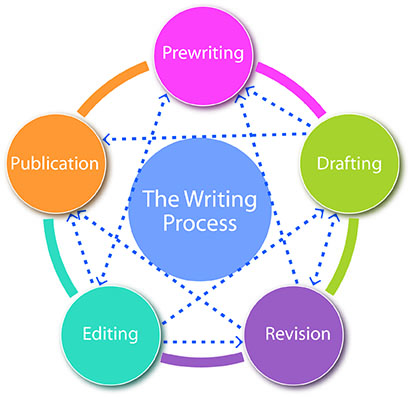College Level Writing Explained
WHAT IS COLLEGE LEVEL WRITING?
Now that you've learned how algorithms and large language models (LLMs) shape what information you find, and you've begun to engage more critically with scholarly research, it’s time to shift your focus from what you discover to how you communicate it. This is where college-level writing begins.
LINEAR V. CIRCULAR WRITING PROCESS
Compared to writing during your K-12 years--brainstorming, outlining, drafting, writing, and submission (---never backwards-->)--writing is a little more complicated; its circular O. Just like the research process, writing is recursive.
No one--professors included--writes a perfect paper on the first try. (See Lamott's infamous Shitty First Drafts). Writing is messy, repetitive, and often frustrating. You’ll have false starts, new sources of evidence, and analysis that needs more development. That’s not failure, that’s the thinking in action.
Simply put, writing is the act of critical thinking. Which means, writers don’t always know what to say until its written it down. And that’s the beauty and magic of writing: it helps us uncover ideas, make sense of complexity, and see connections we hadn’t noticed before. Writing isn’t just a way to express finished thoughts; it’s how we discover them. The only right way to write, is to start.

A Note on LLMs and Writing
ChatGPT Generates D Work
To a novice rhetorican, LLMs makes writing "sound smart," but underneath there is nothing there. No meat on the bone, just juicy skin. A word salad. Boring dribble. Flat, non-unique overused robotic vocabulary. College professors care about ideas.
As we've learned AI does note write. Echoed here by author and expert John Warners states, "Large language models cannot 'write.' They generate syntax. They do not think, feel, or experience anything....The things ChatGPT is 'smarter' at--primarily the speed and efficiency of production--are relatively limited as compared to our capacities for human experience, reflection, analysis, and creativity..." (More than words, writing in the age of AI).
And to be perfectly transparent, your first-year professor values just that--your human experiences, reflection, analysis and creative skills much more than your speed.
Further Reading: Forbes | "The Risk Of Losing Unique Voices: What Is The Impact Of AI On Writing?"
"As a writer, if you heavily rely on AI to improve your grammar or refine your ideas, you risk losing yourself in the process. Consequently, you stand to lose your readers and followers....Articles written by humans received significantly more views."
